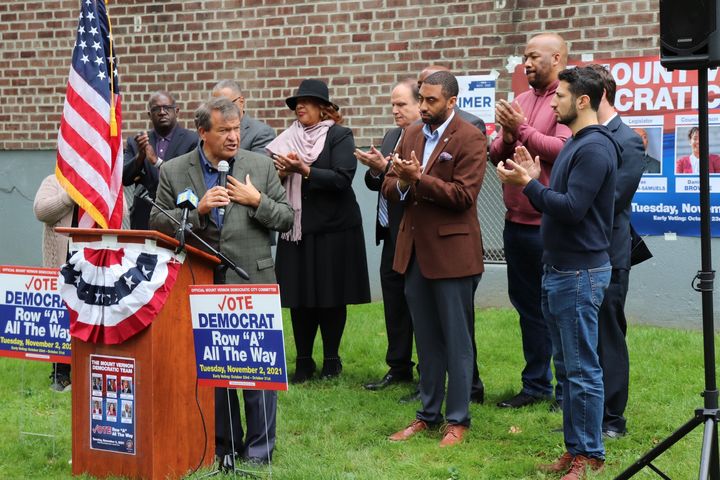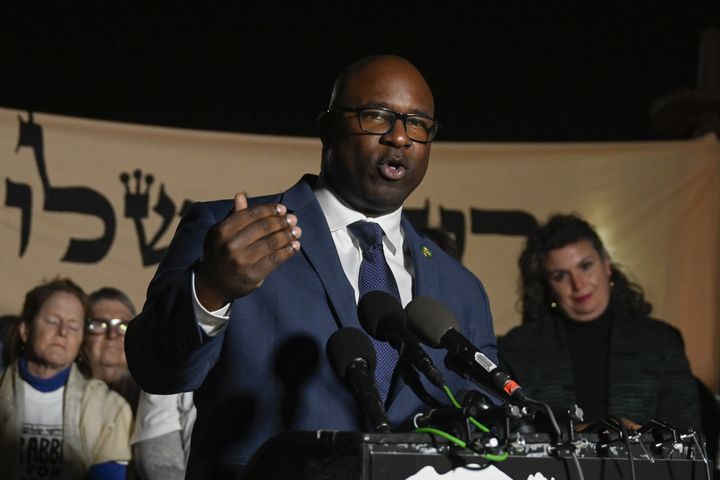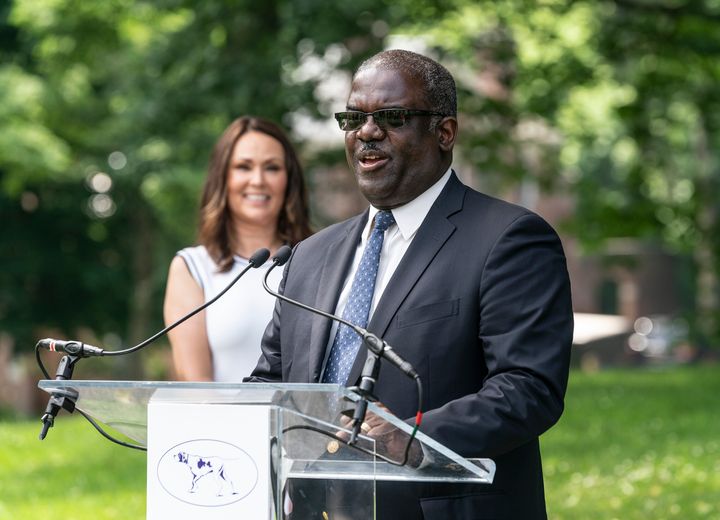
When Westchester County Executive George Latimer ascended the podium at the Black Democrats of Westchester’s annual reception in late January, he chose to speak about the abundance of Black elected officials who now dot the majority-white, suburban county.
Listing out Black officials — from state Senate Majority Leader Andrea Stewart-Cousins and his own hand-picked deputy county executive to more local figures — Latimer described the present moment as the product of decades of hard work toward achieving racial equality.
“That’s a sign of progress,” Latimer recalled of his remarks. “We haven’t made enough progress, but we’re making progress.”
To some in the crowd though, Latimer’s words betrayed a lack of self-awareness. Latimer is currently running to unseat Rep. Jamaal Bowman, lower Westchester’s first Black representative in Congress, who was in attendance as well. The county executive did not mention his Democratic primary opponent when enumerating Westchester’s accomplished Black elected officials.
“The silence was deafening — he goes out of his way not to mention the fact that Jamaal is the first Black man to represent a very diverse district and the fact that he’s actually really challenging someone,” said Shane Osinloye, a progressive member of the New Rochelle City Council, who was present at the event. “I can’t believe that he doesn’t know what he’s doing when he’s trying to surgically remove representation — not just somebody who looks like me and shares my gender, but someone who represents my issues in a way that very few other elected officials do.”
“I don’t know why he chose that particular topic, but that’s on him.”
- Leilani Yizar-Reid, Mamaroneck town trustee
Leilani Yizar-Reid, a town trustee in Mamaroneck who was also present, called Latimer’s comments “insulting.” She questioned Latimer’s decision to even bring up a sore subject in the context of his primary run.
“I don’t know why he chose that particular topic, but that’s on him,” she said. “Know your audience.”
County Legislator Terry Clements, majority whip on the Westchester County board of legislators and chair of the Black Democrats of Westchester, declined to comment on Latimer’s remarks for this story.
The extent to which Bowman supporters are able to raise questions in voters’ minds about Latimer’s racial sensitivity could play an important role in the county executive’s bid to rob Bowman of the Democratic nomination in June. Since New York’s 16th Congressional District, which also includes a sliver of the northern Bronx, is solidly Democratic, this year’s primary will decide which person — and which wing of the party, Bowman’s anti-establishment progressives or Latimer’s mainstream liberals — gets control of a coveted House seat.
The population of New York’s 16th was about one-third Black and one-fifth Latino when Bowman first won there in 2020. But the exclusion of predominantly Black Bronx neighborhoods like Co-Op City from the district during court-ordered redistricting in 2022 reduced the Black share of the district’s population to about 21%, while maintaining the Latino population at its previous level.
Latimer and his Black allies insist that the criticisms of his remarks come from people who are angry about his decision to run, and that the denunciations do not reflect his record as county executive or the depth of his relationships with Black constituents and elected officials.
Referring to his remarks at the January reception, Latimer told HuffPost, “Anyone who took offense at that is probably a person who doesn’t support me and is looking to be offended.”
“There are people who are African American who are unhappy that I am in this race,” he added. “They want to impute racial reasons for my candidacy and there are no racial reasons for my candidacy.”
But it’s not just Bowman supporters who are urging Latimer to exercise discretion with his choice of words.
“It’s easy to cross over from campaigning to being patronizing,” said Basil Smikle, a former chair of the New York State Democratic Party who is more aligned with the party’s moderate establishment but has not endorsed a candidate in the primary. “He’ll need to be careful not to lean into the latter in front of both Black and non-Black voters.”

Invoking His Upbringing
Latimer’s previously unreported comments at the Black Democrats of Westchester event are one of several incidents that his mostly progressive Black critics see as evidence of his tin-eared language on racial matters.
Earlier this month, Black Westchester Magazine reported that Latimer accused Bowman of accepting money from the Palestinian militant group Hamas, which perpetrated the brutal Oct. 7 massacre in Israel, while speaking with a skeptical voter at Black History Month book fair in New Rochelle. Latimer maintains that he was referring to a fundraiser for Bowman organized by pro-Palestine activists sympathetic to Hamas, which the Washington Free Beacon, a conservative outlet, reported on days before the book fair occurred. Bowman’s campaign responded to the reported remarks by threatening Latimer with a defamation lawsuit.
In addition, when Latimer announced his candidacy in December, he defended himself against charges that he is backed by groups that target candidates of color by noting that he grew up in a predominantly Black part of the town of Mount Vernon, and went on to serve as head of the tenants association in a majority-Black apartment building. “I grew up as a white kid in a Black neighborhood, was I a racist?” Latimer asked in an interview with City & State.
In the same City & State interview, he also said that he would not be able to win against Bowman if New York’s unusual mid-decade redistricting had restored parts of the Bronx to New York’s 16th. Latimer’s detractors interpreted the back-to-back comments as evidence that while he would use his Black friends to defend against racism charges, he would be afraid of running in a seat with more Black voters, since a district with a greater share of the adjacent parts of the Bronx would effectively ensure that outcome.
Finally, in a March 2021 Facebook post, Latimer likened the push for then-New York Gov. Andrew Cuomo to resign over sexual harassment allegations to the white lynch mob that murdered the Black teenager Emmett Till in 1955. He later edited the post to omit Till.
“It was a foolish reference,” he told HuffPost.
But of the various comments he’s made that have provoked controversy, Latimer otherwise stands by his words. He defended his decision to invoke his upbringing in a Black community, claiming it was not a superficial bid to curry favor with Black voters.
“I do not have the mindset that, ‘Oh my God, I have to speak carefully, because I might offend,’ because I speak honestly and openly.”
- George Latimer, Westchester County executive
“If you look at me and see I’m white, you might make assumptions about who I am, what I am, what my exposure to the African American community is,” said Latimer, who now lives in the predominantly white coastal town of Rye. “‘He’s living up there in Rye, New York. What does he know?’ And I’m telling you, this is the world I live in.”
“I’m comfortable in my own skin dealing with African Americans as well as whites,” he added. “I do not have the mindset that, ‘Oh my God, I have to speak carefully, because I might offend,’ because I speak honestly and openly.”
In a separate part of his interview with HuffPost, Latimer asked that people judge him on how he has served Black constituents: As county executive, he’s allocated $1 million for a pilot program to improve Black maternal health in Yonkers; upped funding neighborhood health centers in predominantly Black areas; and invested $40 million in the renovation of a sports complex in Mount Vernon. He also takes credit for lending a hand to aspiring Black politicians: by tapping Ken Jenkins to serve as his deputy after defeating him in the 2017 Democratic primary for county executive, and before that, by stepping aside in 2001 as chair of the Westchester County Board of Legislators, the main county governing body, so that the late Lois Bronz could become the board’s first Black chair.
“That’s what I’m offering,” Latimer said, referring to his accomplishments. “I’m not offering my demographic package versus somebody else’s demographic package.”
And indeed, what Latimer is offering is appealing to at least some prominent Black Westchester residents, including County Legislator Ben Boykin, Pastor Lamont Granby of First Baptist Church in Bronxville, and Bishop Troy DeCohen of Mount Vernon Heights Congregational Church — all of whom have relationships with Latimer that predate Bowman’s tenure in Congress and are now supporting Latimer’s congressional bid.
“He’s always been an aid to our community,” DeCohen told HuffPost. “He’s been a good county exec.”

‘Hamas Supporters’ Or ‘Hamas?’
When it comes to the incident at the book fair in New Rochelle, the three parties involved — Latimer, the woman who confronted him, and A.J. Woodson, the editor-in-chief of Black Westchester, who witnessed the dustup — agree about everything that occurred except for the key detail of what Latimer actually said about Bowman’s donors.
Latimer was walking around the event unaccompanied, and a woman, who has requested anonymity to ensure her personal safety, approached him to ask why he is running against Bowman. Latimer said that he believes that by being more pragmatic and discreet, he would deliver for the district more effectively than Bowman — an answer that the woman did not find satisfactory.
Then, the woman, who told HuffPost that she is a staunch progressive and would have been supporting Bowman regardless of how the interaction went, told Latimer that she considers his reliance on donations bundled by the American Israel Public Affairs Committee to be tantamount to “taking money from the devil.” (She told HuffPost she principally objects to what she sees as AIPAC’s targeting of candidates of color and use of large sums to intervene in Democratic primaries. AIPAC maintains that its electoral considerations are solely based on candidates’ support for Israel and notes that it has backed many candidates of color and sought to unseat several white elected officials.)
According to Latimer, he replied that if the woman took issue with his financial backers, she should know that Bowman had received donations from “Hamas supporters.” The Washington Free Beacon’s reporting that Bowman attended a fundraiser whose co-hosts included someone that condoned the Oct. 7 attack and another person affiliated with a group that declined to condemn it, has not been rebutted. (Bowman immediately condemned Hamas’s actions the day of the attack.)
“If you’re going to talk to me a certain kind of way, I’m not going to be a pin cushion,” Latimer said of his decision to argue with the voter.
Woodson, who was listening in, swears that he heard Latimer say that Bowman received money from Hamas. “He never said [supporters,] he said Hamas,” Woodson recalled. “That’s a pretty strong statement.”
The woman with whom Latimer spoke is less certain than Woodson about which words Latimer actually said. “I cannot remember his verbatim words,” she said. “But I know that A.J. Woodson was literally within a few feet, and a part of this conversation, so I defer to him for the exact wording.”
Regardless, the woman faults Latimer for immediately deflecting the criticism of AIPAC, and for citing a conservative news site to support his point.
“The goal is to try to draw a connection between Bowman and Hamas,” the woman said. “It is like a flashback to the Southern Strategy.”

A Deputy Defends Latimer
Jenkins, Latimer’s deputy, told HuffPost that Latimer’s pugnaciousness when speaking to prickly constituents has nothing to do with race. He is accustomed to seeing Latimer express frustration with any number of advocates or voters —including those griping about issues as mundane as the future of the county airport — who dictate complaints to elected officials rather than have constructive conversations.
“A lot of these things you’re talking about have the same consistent thread, which is, ‘We want to speak truth to power. We want to tell you what to do,’” said Jenkins, who shares Latimer’s exasperation with bad-faith complainers. “Why don’t you look at what we have done? We’re listening to you, otherwise we wouldn’t be here.”
Jenkins currently serves on New York’s Independent Redistricting Commission, where his fellow commissioners elected him chair. The commission proposed a new map of congressional district boundaries on Feb. 15 that surprised observers for its lack of changes, including to New York’s 16th.
HuffPost asked Jenkins whether his presence on the commission, as a Latimer ally, was not a conflict of interest on a panel whose decisions would affect Latimer — and indeed, whose latest map ultimately spared him from having more of the Bronx in his district. On the other hand, though, the proposed map also preserved the liberal communities along the Hudson River, where Bowman retains major support. (Once the commission’s work is officially over in the coming days, Jenkins plans to formally endorse Latimer.)
Jenkins responded by pointing out that the arrangement was legal. “Our attorneys did their due diligence and determined” that his service on the commission was not an illegal conflict of interest, he said.
Jenkins also noted that he cast just one of the votes for the map, which the 10-person, bipartisan commission adopted by a nine to one margin.
Even that part of Jenkins’ input will be limited. The map now heads to the Democrat-controlled state legislature for approval, where it is expected to be rejected following U.S. House Minority Leader Hakeem Jeffries’ (D-N.Y.) indignant reaction to it.
Jeffries, a Brooklynite, claimed the map violated the state constitution’s ban on partisan gerrymandering, though most observers believe he wants Democrats in the legislature to draw more favorable lines for Democrats. Since Jeffries’ speakership rides to a considerable extent on a strong showing in New York, he is likely to exercise considerable influence over the legislature’s redistricting process.
Of course, Latimer has a lot of shared history with Democrats in the state legislature as well, having served as a state Assembly member from 2004 to 2013, and in the state Senate from 2013 to 2017. His relationships there could spare him a boundary modification that would re-incorporate still more Black voters into his district.
Should Democratic lawmakers seek to make New York’s GOP-held 17th Congressional District to the North more Democratic, however, they might have no choice but to shift liberal parts of New York’s 16th into the 17th. That would almost certainly require them to bring more of the Bronx into New York’s 16th to backfill the population deficit, presenting the same conundrum for Latimer.
But Latimer’s detractors think he should simply get used to having to fight harder for Black votes.
“Democrats — white candidates and even Black candidates — they take it for granted that they’ve got the Black vote,” Woodson said. “Now you’re challenging the first African American to hold that position, the incumbent Democrat, and you’ve got these comments being thrown around.”
“Is this the real him all along?” he added. “Those questions are being asked by some voters — not all, by some voters.”
